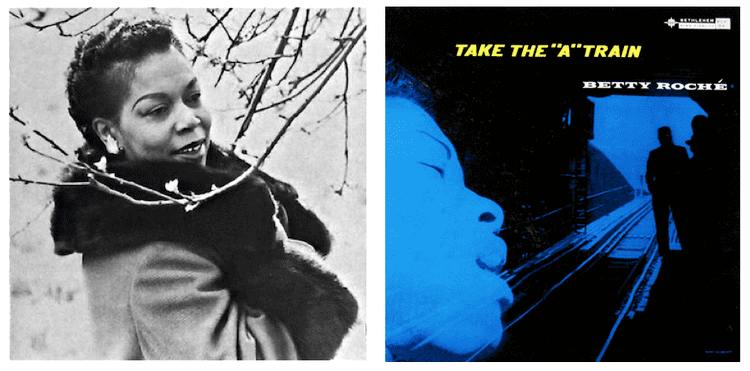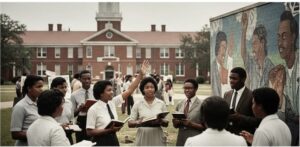Betty Roche, a blues and bebop stylist in the ’40s and ’50s

by Herb Boyd
If by chance and good fortune you have heard one of the most popular versions of Duke Ellington’s “Take the A Train,” then you undoubtedly were enthralled by the voice of Betty Roche, and her marvelous interpretation of this classic.
But giving voice to an Ellington favorite is but one aspect of Roche’s remarkable singing career that was most evident in her jazz and blues recordings. She was born Mary Elizabeth Roach or Roche, depending on the source, on Jan. 9, 1918, in Wilmington, Delaware and raised by her grandparents in Atlantic City, New Jersey. Like Ella Fitzgerald, she zoomed onto the musical genre as a teenager after winning a contest at the Apollo Theater’s Amateur Show in 1939. Two years later she was a featured vocalist with the Savoy Sultans. With this group she made her debut recording just before the ensemble disbanded. That song was entitled “At’s in There,” with no indication who At was.
In 1943, she was in front of the Ellington orchestra, having replaced Ivie Anderson. A year later she appeared in “Reveille with Beverly” in a film with Count Basie and Frank Sinatra, in which she performed a version of “Take the A Train” but because of the AFM recording ban it did not make it to disc, a ban that disrupted her career and many others. She met a similar fate when she sang Ellington’s performance of “Black, Brown and Beige” at Carnegie Hall, delivering the blues segment of the composition, and by the time the ban was lifted she was no longer with the orchestra.
Her reputation with Duke’s band made her available for several other notable leaders, including tenor saxophone immortal Lester Young and trumpeter Hot Lips Page in the mid-’40s. She was often on the bandstand at Minton’s Playhouse in Harlem with such musical giants as Thelonious Monk and drummer Kenny Clarke. In 1944, Roche was again with a topflight band, joining Earl Hines and his group, where she also recorded.
It is not clear why she took a seven-year hiatus from performing before rejoining the Ellington’s band in 1951, whereupon she recorded an extended version of “Take the A Train.” Three years later she left the band and embarked on a rather erratic odyssey, though she continued recording for Bethlehem and the Prestige labels. She settled in San Diego, Calif., working only occasionally in clubs with various groups. It was during this period she had a role in the recording of “The Complete Porgy and Bess.”
Roche was a formidable stylist whether in an up-tempo bebop tune or in a more soulful blues number. As one reporter noted, quoting Ellington, Roche “had a soul inflection in a bop state of intrigue and every word was understandable despite the sophisticated hip and jive connotations.”
Her discography was reflective of a singer seemingly only half interested in promoting her career, including “Take the A Train” on the Bethlehem label in 1956; “Singin’ & Swingin’” for Prestige in 1960; and “Lightly and Politely” for Prestige in 1961.
There were numerous occasions when her appearances were not reported and she was often in the company on tuneful journeys with such leaders as Clark Terry and pianist Charles Brown.
On Feb. 16, 1999, Roche died in Pleasantville, New Jersey at 81, and was survived by several grandchildren.








